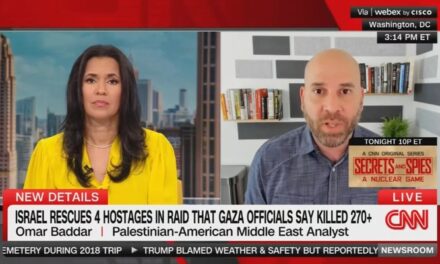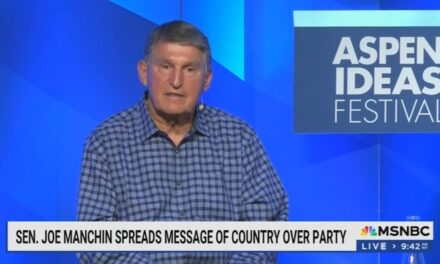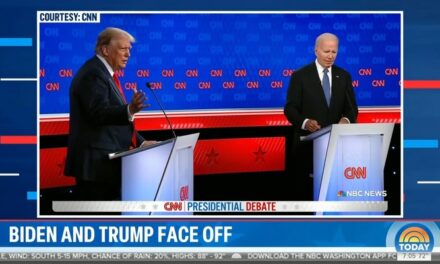We support our Publishers and Content Creators. You can view this story on their website by CLICKING HERE.
On Monday, police cleared the latest “pro-Palestinian” encampment at Cal State-Los Angeles, as Associated Press reported it came “just days after demonstrators occupied and trashed a building while the school’s president and other employees were still inside.” The establishment media promoted these leftist tactics for weeks.
How did taxpayer-funded media cover the anti-Jewish, pro-Hamas protests that dominated college campuses this spring? A new Media Research Center study analyzed the words used by Public Broadcasting Service (PBS) reporters, guests, and talking heads over 36 days of protest coverage and found PBS’s flagship news program NewsHour/News Weekend to be overwhelmingly on the side of the protesters, downplaying their pro-Hamas, anti-Jewish rhetoric, not challenging the protesters on their sympathy for the eliminationist goals of Hamas, and even rediscovering the merits of “free speech.”
Key Findings:
- “Pro-Palestinian” labels vs. “Pro-Hamas” labels: 29 to 0. PBS reporters were comfortable describing the radicals with the evasive and flattering term “pro-Palestinian,” while more accurate labels were non-existent. Four students used the inaccurate word “genocide” against Israel.
- “Free Speech” labels vs. “Hate Speech” labels: 17 to 3. All it took was leftist students saying offensive things for PBS reporters to decide free speech was worth defending again.
- Bias by Omission: Only two of the 28 total campus protest reports mentioned the October 7 massacres, only one mentioned the “From The River to the Sea” chant threatening ethnic cleansing, and none mentioned the call for “intifada” against the Jewish state.
Things kicked off April 17 when protesters set up tents on the Columbia University quad, the same day school president Minouche Shafik testified before Congress on previous antisemitic incidents on campus. The radical-left protests opposed to Israel’s war against the Hamas terrorists who killed, raped, and kidnapped Israeli civilians on October 7 quickly spread to other leftist universities nationwide. The first NewsHour mention of the Columbia protests came on April 18, and the last in the study’s range came May 23.
■ “Pro-Palestinian” labels vs. “Pro-Hamas” labels: 29 to 0. PBS reporters were comfortable describing the radicals with the evasive and flattering term “pro-Palestinian.” Anchor Amna Nawaz did so on April 26: “…we continue to report on the spread of these campus protests, pro-Palestinian protests, by and large, and protesting Israel’s war conduct in Gaza.”
A somewhat more accurate label, “anti-Israeli,” was used by substitute anchor William Brangham in a May 3 segment, but in that case Brangham was actually disparaging critics of the protests, lamenting how the protesters unfairly risked “being branded as antisemites” by them: “I mean, Jonathan [Capehart], a lot of the critics of these protests like to say that it’s all antisemitism, just a hot stew of anti-Israeli bias. I was at one of the NYU protests earlier this week, and there is some of that, for sure. But it’s mostly young people, as you were describing, who are despairing over what is happening in Gaza. How is it that people who care deeply about this issue can’t — can somehow protest and not be risked being branded as antisemites?” Those “caring” protesters wore Palestinian-associated kaffiyeh scarves and brandished threatening signs while chanting anti-Israel eliminationist rhetoric.
No PBS journalist used the phrase “anti-Jewish” (its only appearance came in a quote from a student) and no one described the protesters as “pro-Hamas,” although that phrase would more accurately capture the truth. By contrast, PBS ran quotes from four students falsely using the term “genocide” to refer to Israel’s war on Hamas where the terrorists are using the Palestinian people as human shields.
■ “Free Speech” labels vs. “Hate Speech” labels: 17 to 3. All it took was some leftist students saying offensive things for PBS reporters to decide free speech was worth defending again, after years of lectures about alleged “hate speech” committed by conservatives online.
Journalists mentioned “free speech,” “free expression,” or similar wording 17 times, while the previously popular concept of “hate speech” was almost ignored, even as it became a valid concern on campus. There were only three mentions of “hate speech” by journalists, two coming in a May 7 segment prodded by, of all things, a speech by President Joe Biden, who spoke about antisemitism at the U.S. Holocaust Memorial Museum.
Nawaz conducted a combative April 25 interview with Vanderbilt University Chancellor Daniel Diermeier after he ended a ridiculous sit-in by students in his office by calling in police assistance: “You said in your op-ed that free speech is alive and well at Vanderbilt. But there was an open letter by several members of your faculty that disputes that. They say the administration has been excessive and punitive in its response to student protests. They say the rules seem arbitrary. And they say the criterion that protests must not disrupt university operations, as you say, is perniciously vague and expansive. What do you say to that?”
Reporter Lisa Desjardins conducted a surprisingly hostile interview May 7 with New York Times columnist David French, who insisted the often-vile protests were depriving other students of their own civil rights. She didn’t see the problem: “But I also don’t know that there is an espoused right to sleep or right to have the most convenient path to the library.”
■ Divestment: On 24 occasions PBS reporters mentioned “divestment” from Israel, the supposed chief priority of the campus protests. Show guests, mostly college professors, brought it up 45 more times, though oddly, the students interviewed mostly didn’t (mentioning it only 6 times) even though that was supposedly the reason they were encamped.
Briefly, calls for “divestment” are demands that university endowments cut ties to companies with alleged links to the Israeli military and other companies. It’s the middle initial in the antisemitic Boycott, Divestment and Sanctions (BDS) movement, a way to delegitimize Israel’s right to defend itself. Yet PBS treated it as a positive and reasonable request, hosting guests two nights in a row to discuss it (April 29-30).
Nawaz’s April 26 divestment coverage harkened back to the 1960s and sounded hopeful that the pro-Hamas campus occupiers would inspire similar political change: “Many say today’s demonstrations echo college protest movements of the past, including against the Vietnam War….Other Vietnam War protests in the 1960s and ’70s led to clashes with authorities and mass arrests, but over time they helped to shift public opinion leading up to the eventual U.S. withdrawal. In the 1980s, a similar movement popped up at universities nationwide, calling for divestment from South Africa to end apartheid. Today, some students say they’re taking lessons from those very protests.” (When a journalist compares something to the anti-war protests of the 1960s it’s always meant to be flattering.)
On the May 3 political roundtable, reporter William Brangham asked the Washington Post’s Jonathan Capehart: “On these protests that we saw growing across college campuses around the country, calls for divestment, some clashes, police being sent in in some cases. What do you make of this growing protest movement?”
Capehart’s fawning reply bore no relation to the hate actually being spewed out on campuses: “Well, one, what we’re seeing is the passion of the students and the passion of the community around these universities over the issue of what’s happening in Gaza. Remember, these protests started happening because of the humanitarian crisis there in Gaza.”
Meanwhile, the accurate word “antisemitism” cropped up in journalists’ coverage a relatively sparse 31 times, about the same as that phony issue of “divestment” (24). (As previously noted, two of those 31 labels were actually challenging the assumption of antisemitism, not confirming it.)
■ Bias by Omission: Unflattering terms to describe the protesters were rarely uttered by PBS journalists. Only two of the 28 total campus protest reports mentioned the October 7 massacres, only one of 28 mentioned the “From The River to the Sea” suggestion of ethnic cleansing, and none mentioned the call for “intifada” against the Jewish state, a call to violence against Jews and the Jewish state (there was one mention by a student).
■ Bright Side: Reporter Stephanie Sy’s twelve-minute story on May 8, which dealt with the language used during the debate, contained the sole mentions by a PBS journalist of “terror attack” and “From The River to the Sea” (a phrase heard chanted by protesters during her report).
Of the three positive “pro-Israel” labels used by reporters to describe those opposed to the radicals, two were from Sy’s report, swamped by the deluge of 29 “pro-Palestinian” labels overall. Of 10 total mentions of “Hamas” by PBS journalists in protest coverage, Sy’s report contained five. Of five total mentions of “October 7,” her report contained four.
Sy was also the only PBS reporter who specifically noted that some of those “pro-Palestinian” student groups supported the October 7 massacre: “None of the pro-Palestinian students NewsHour interviewed expressed support for Hamas’ actions on October 7, but some student groups have lauded the attack.” Sy’s report was far more in keeping with PBS’s mission of “strict adherence to objectivity and balance.” But it was as strong as PBS’s protest criticism got.
CONCLUSION:
The taxpayer-funded Public Broadcasting Service that airs PBS NewsHour and PBS News Weekend was launched in 1969 by the Corporation for Public Broadcasting, born with a congressional mandate to maintain “strict adherence to objectivity and balance in all programs or series of programs of a controversial nature.” PBS’s invariably respectful coverage of the radical campus takeovers after the Hamas massacre did not meet that standard.
Methodology
MRC analysts noted every mention of the campus protests on PBS NewsHour and its half-hour weekend counterpart, PBS News Weekend. Between April 18, 2024, and May 23, 2024, PBS aired 16 full stories, eight partial stories (in the “news wrap” segment), three discussions during its Friday weekly political roundtable, and one discussion during its Monday Politics segment. In all, PBS devoted 28 instances of reporting to the protests, comprising 8513 seconds (142 minutes) of screen time. MRC tabulated and examined 17 separate word clusters, both pro-Israel and pro-Hamas, spoken (or not spoken) by PBS journalists, guests, and talking heads over the scope of the study.

 Conservative
Conservative  Search
Search Trending
Trending Current News
Current News 





